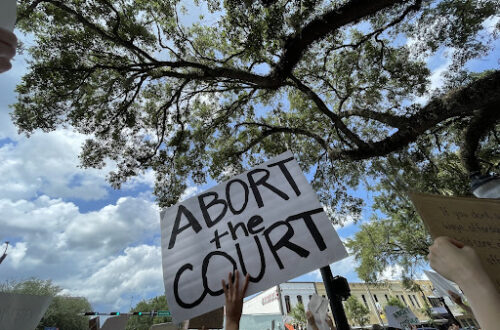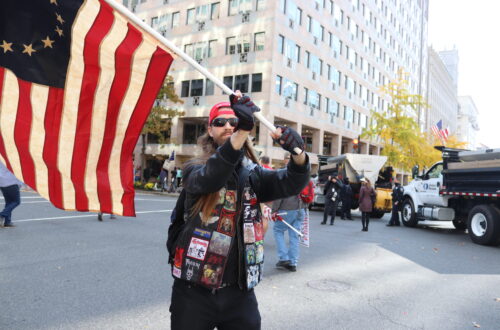A slew of controversial legislation breezed through the Florida Legislature this session. Many bills succeeded, but one failed thanks to the power of a determined public: SB 86, a bill proposed by Sen. Dennis Baxley, R-Lady Lake, to alter educational funding including the Bright Futures scholarship.
For Floridian students and parents, the Bright Futures scholarship provides a critical boost to their ability to pay for college, especially for low-income students. Studies have shown it pushes students to take challenging coursework, promotes retention of students in Florida, and may lower the exit debt of low-income students.
SB 86 would have slashed Bright Futures for thousands of college students by creating a list of majors and denoting their eligibility for funding. In later forms, the bill would have redirected Bright Future funds to the annual state budget, giving state legislators the ability to determine the amount students receive on a year-to-year basis. It would be death by a thousand paper cuts for Bright Futures.
Students and parents saw this and stood up.
Action happened quickly online. Several accounts emerged on Instagram among the youth — a mix of high school students and college students — in just the first few weeks. This included Save Bright Futures, Stand For Bright Futures and Reject SB 86. Others like United For Bright Futures and No To SB 86 would later arise.
The students who operated Save Bright Futures made a website that served to provide information on SB 86.
Parents organized as well. On Facebook, one prominent parent page that emerged was Florida Voters Against Scholarship Cuts.
These online pages served as a way to share strategies and pool resources.
I felt the imperative to act because I knew that I had to do something or else be complicit in this bill passing. I started with a post on my personal Instagram. Realizing soon that it wasn’t enough, I launched one of the aforementioned accounts: Stand For Bright Futures.
All of the social media accounts sprung up independently, but they were united under a common disdain for SB 86. Some soon united into a coalition, the Coalition For A Brighter Future in Florida. We realized that we were better if we coordinated and soon launched a Day of Action. Save Bright Futures created a letter generator to allow people to write to their legislators easily.
A petition on Change.org by one student garnered about 138,568 signatures against the bill, many of those by students.
Action soon manifested in the real world as well.
People were passionately opposed to outside interference in their education; 70 speakers showed up to the Senate Committee on Education’s hearing on SB 86. Students did not want their majors chosen for them because they could not afford to study their true passions.
Of those who spoke were representatives from several college student governments including Florida State University, New College of Florida, Florida A&M University and University of North Florida.
In March at University of Florida, one student and her friends bought space on 34th Street in Gainesville to paint a mural against SB 86. At University of South Florida and in Tampa, students also protested the bill through late April.
GOP senators pushed on, but students did too. In the meantime, the actions of students and parents caused media attention to grow. Politico even interviewed Save Bright Futures.
With time, the issue gained more attention. More and more students became angry at the nerve of the Florida Legislature and took action.
As Baxley noted in a letter to legislators, “We have awakened a giant.”
Why did this issue draw such public ire? Sen. Jennifer Bradley, R-Orange Park, might show why.
Her vote was the deciding vote to advance the bill past its first committee. If she had voted with the students of Florida, the bill would have died in committee.
She advanced the bill, despite having “concerns.” She knew this bill was flawed from the beginning, yet she chose to advance it. Ultimately, she could pay for her kids’ education, so this bill was of little concern to her wallet, but the public response revealed Bradley’s hesitation. This created an opening.
Frequently, legislation lives or dies over whose pocketbook it affects. Unfortunately, for many students across Florida who fought against SB 86, they do not have a lot of options.
The bill ultimately passed in the Florida Senate without the support of two Republicans. One of them was Bradley, and the other Sen. Keith Perry, R-Gainesville, who represents UF. Once the bill reached the Florida House, it was so contentious that they refused to bring it to the floor.
Speaker Chris Sprowls, R-Palm Harbor, championed the bill when it was first announced, but he later let it die, changing his viewpoint alongside Bradley. It seems it was clear to him that this was a tough battle that was not worth it in the final days of the legislative session.
The fact that all of this is being spoken of in the past tense is good: students and parents acted.
Students started by fighting for their freedom of choice in their major. It evolved into a fight to not have one of few equalizers for low-income students taken away.
Students must remain vigilant because a similar measure could raise its ugly head.
No costly lobbying occurred — protests occurred. Students and parents used the power of the internet to coordinate in ways that cost nothing.
You do not have to get out on the streets to make change. When some injustice arises, you can use the internet to spawn a movement from your living room. The internet is a powerful tool for rapid mobilization.
Stand For Bright Futures reached out, asking what Bright Futures meant to students. The common thread: without it, they either would not study or would be racked with debt. SB 86 challenged Bright Futures’ ability to empower students; the people of Florida fought back through social media, petitions and phone calls.
They showed the might of a public determined to promote brighter futures in Florida. They won.
Check out other articles from Florida Political Review here.
Featured Image: Classroom building at University of Florida (Unmodified photo by Steven Martin on Flickr used under a Creative Commons license. https://bit.ly/2TRhUL3).





